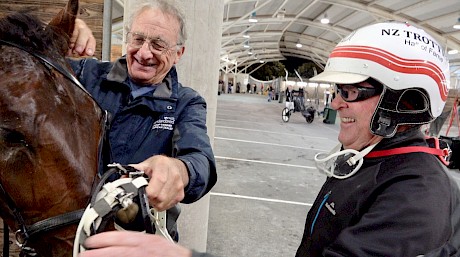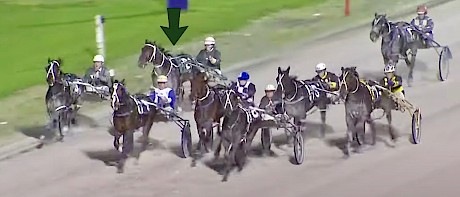Since when do we penalise our harness racing drivers for making tactical errors in races?
While punters might have been upset when Maurice McKendry chose the wrong option on Simply Sam (American Ideal) at Alexandra Park a week ago, and saw their horse run to the line untested behind a wall of horses, does that mean charges should follow?

Drivers make the wrong calls in virtually every race at every meeting but many, unlike that with the warm favourite at Auckland, go undetected.
McKendry would be the first to admit his decision to cut down closer to the markers and not go wide behind eventual winner Harder Than Diamonds didn’t have the intended outcome.
But did it warrant a charge of failing to take all reasonable and permissible measures to ensure his horse was given full opportunity to win the race or to obtain the best possible position?
SIMPLY SAM REPLAY
Most drivers would have defended the charge but that’s not the McKendry way. New Zealand’s second most successful harness driver of all time, who has racked up 3353 winners in 47 years in the cart, could care less what the silly buggers think.
McKendry simply admitted the charge and his penalty will be decided on an as yet unscheduled date.
But you only have to examine decisions from earlier hearings into the charge to see a guilty finding was far from certain.

In dismissing a December, 2021 case against junior driver Korbyn Newman from Westport, adjudicator Olivia Jarvis made several crucial points.
“It is well established that the stewards do not need to prove that there was a deliberate act by the driver to disadvantage the horse, however, there must be some degree of carelessness or incompetence in order to find the driver’s actions blameworthy.”
Mere errors of tactics are not sufficient to find liability, she ruled.
“Given the nature of harness racing, at any one point in a race a driver may have a number of options available. The decisions are required to be made in a mere instant with multiple uncontrollable variables.
“A driver must, relying upon his or her experience and expertise, balance up a number of competing factors and chose one.
“The driver does not have the benefit of hindsight, multiple video angles or the pause button.”
Jarvis said situations arose during races where drivers were presented with two reasonable and permissible options.
“Failure to implement one of these options could not merely equate to a breach. I am of the view that the purpose underpinning the rule is to attribute blameworthiness when a driver fails to take some measure which was the ONLY reasonable and permissible measure open to them.”
McKendry clearly had two options. Shift in, save many lengths, round the turn, and look for a gap in the run home, or go wide.

McKendry said he made the decision on instinct.
“I had two choices – do I slaughter the horse going wide or not? As it turned out I made the wrong one. It was a wet night, the track was slushy, and my horse was flat and struggling round the bend.
“Sometimes you can get up the lane but Tony’s horse (Mr Kaplan) laid in. If I’d got up the inside and won I’d have been labelled a hero. I took my chance and it didn’t pay off.”
But McKendry said there was no guarantee he would have won had he stayed where he was.
“I’d have finished in the first four because he always finishes on but to win I’d need to have run 56 or better on a wet night, coming four wide.” (The winner Harder Than Diamonds was in front of Simply Sam and clocked 56.4 for his last 800.)
McKendry said the tactic of switching in might work perfectly next week but he’d now be thinking twice about repeating it.
McKendry said he knew the stewards had to protect the punter but in squaring off to them they were ignoring the fact Simply Sam, while a nice horse, had come a long way very quickly and was racing far better performed horses on the night.
“I didn’t think I was guilty but I’ve been in too many inquiries to know you can’t win and they go easier on you when you plead guilty.”
Was it incompetent for McKendry to think by going very wide Simply Sam would have too much ground to make up in the straight, even knowing the horse’s great turn of foot? Hardly.
It’s only when tactical errors amount to bad judgement that the terms of the rule are applicable, Jarvis said. Drivers must have deviated from a standard of driving the betting and racing public are entitled to expect.
“There may be circumstances in which a driver’s manner of driving may amount to merely a permissible error of tactics.
“The betting and racing public are not entitled to perfection from drivers, though it is an aspirational goal.
“That much is confirmed by the use of the qualifier “reasonable” in the rule.
“What is required when assessing manoeuvres and decisions by drivers is a reasonable justification for taking particular measures at the relevant time.”
As much as it hurt punters, McKendry surely had such justification. And what kind of precedent has this set?
- Stewards last night found Jay Abernethy and Andrew Poutama guilty on the same charge, suspended them for three days and fined them $400 and $300 respectively. But their charge related to a speed duel at Cambridge on June 3 when Peter Forsberg and Rory McIlroy went at it for the first 700 metres of the race, the horses ending up beaten 50 lengths and 85 lengths.
by Barry Lichter, reprinted with permission from Lincoln Farms

 USA
USA Canada
Canada Australia
Australia New Zealand
New Zealand Europe
Europe UK / IRE
UK / IRE

